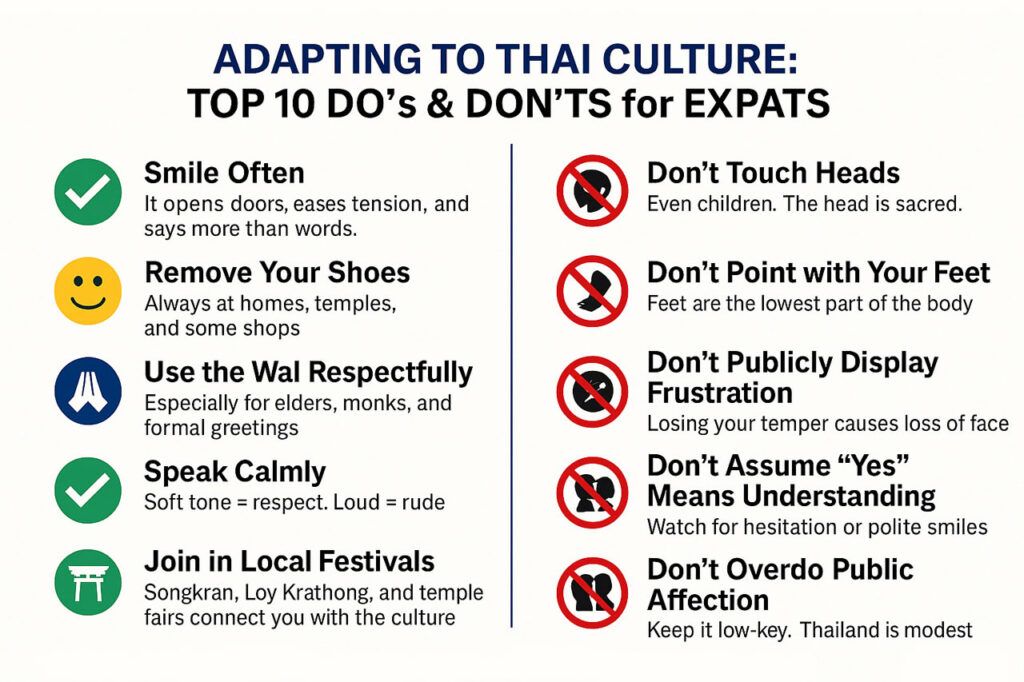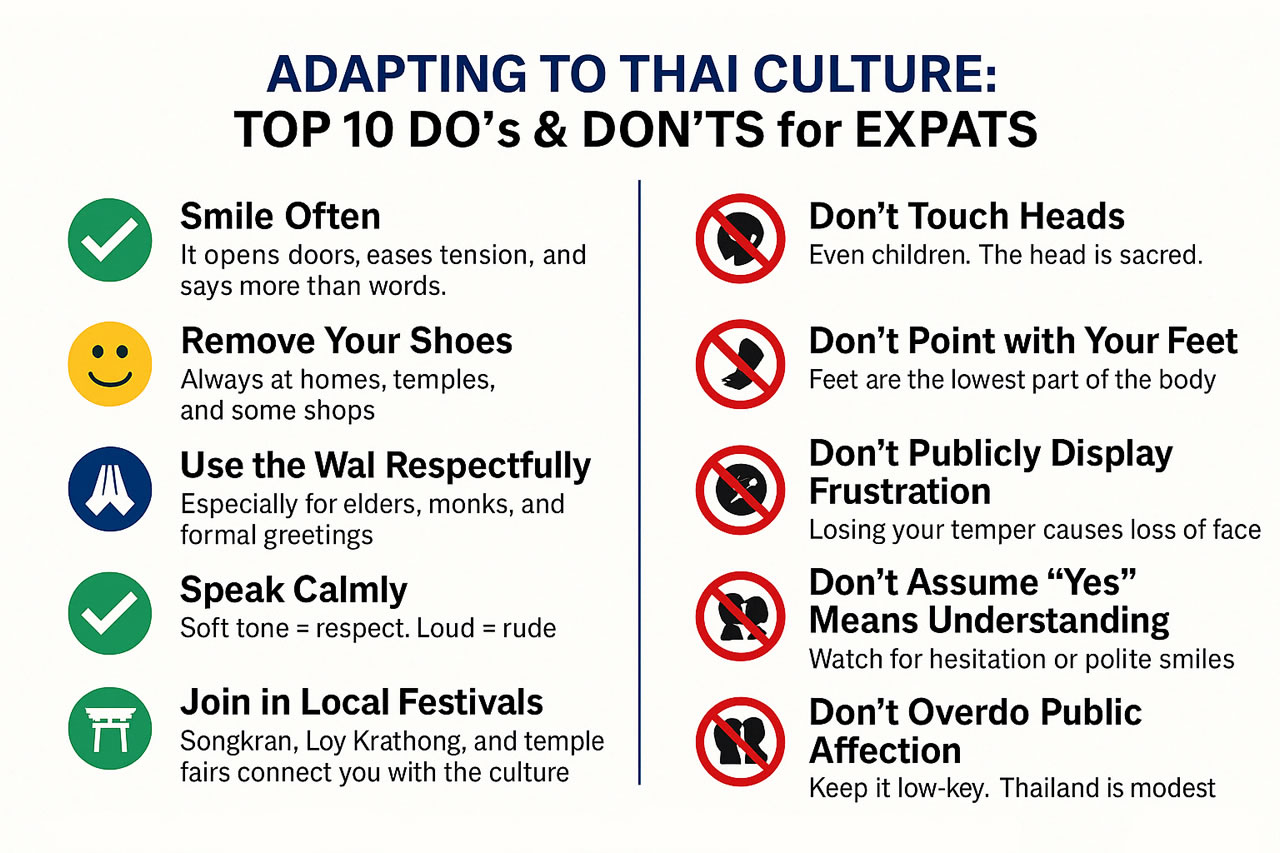
Thailand has a rich culture with long-standing traditions and values. Learning a little about local etiquette can make your visit smoother and help you connect better with the locals. Thai people are generally friendly and welcoming, but showing respect for their customs goes a long way and will always be appreciated!
To help you understand Thai customs, I’ve put together a simple list of Do’s and Don’ts. Following these guidelines will help you avoid awkward moments and make your time in the Land of Smiles even more enjoyable.
Cultural Do’s
1. Respect the Monarchy
The Thai Royal Family is deeply revered, and any form of criticism or disrespect toward them is taken very seriously! Speaking negatively about the monarchy can lead to severe legal consequences, including imprisonment. You will notice that images of the King and Royal Family are displayed in public spaces, homes, and businesses – treat these images with respect.
2. Dress Modestly in Temples
Thailand is home to stunning Buddhist temples, but visiting these sacred places comes with a dress code. Both men and women should wear clothing that covers their shoulders and knees. Avoid wearing tight or revealing outfits. Additionally, remove your hat and sunglasses before entering temple grounds as a sign of reverence.
3. Use the Wai (Thai Greeting)
The Wai is a traditional Thai greeting, performed by pressing your palms together in a prayer-like gesture and slightly bowing your head. It is a sign of respect and is commonly used when greeting elders, monks, or someone in a higher social position. While tourists aren’t expected to master the Wai, returning it when offered is appreciated.
4. Remove Shoes Before Entering Homes and Temples
It is customary to take off your shoes before entering a Thai home, temple, or certain businesses. Many establishments provide shoe racks outside their entrance. Walking inside with shoes is considered disrespectful and unhygienic. When in doubt, observe what the locals do.
5. Show Respect to Elders
Age and social hierarchy play significant roles in Thai society. Elders are treated with great respect, and younger individuals often defer to them in conversations and social situations. Using polite language, offering your seat to an elderly person, and greeting them with a Wai are all ways to show respect.
6. Keep Calm and Smile
Thais value harmony and prefer to avoid confrontation. Losing your temper, arguing, or raising your voice is seen as disrespectful. If you encounter a frustrating situation, stay calm and handle it politely. A friendly smile can go a long way in resolving misunderstandings and maintaining a positive interaction.

Cultural Don’ts
1. Do Not Touch People’s Heads
In Thai culture, the head is considered the most sacred part of the body. Even touching a child’s head, which may be seen as affectionate in some cultures, is generally frowned upon. Avoid patting, rubbing, or making unnecessary contact with someone’s head.
2. Do Not Point Your Feet at People or Buddha Statues
Feet are viewed as the lowest and least pure part of the body. Pointing your feet at someone, especially a Buddha statue or monk, is considered highly disrespectful. When sitting on the floor, tuck your feet behind you instead of stretching them out in front.
3. Avoid Public Displays of Affection
While hand-holding is acceptable, kissing, hugging, or any overly affectionate behavior in public is generally frowned upon. Thailand is a modest society, and public displays of affection can make locals uncomfortable, especially in rural areas and religious sites. This does obviously not apply to the various beer bars and nightlife venues.
4. Do Not Raise Your Voice or Show Anger
Expressing frustration or anger openly is considered impolite. Thais value maintaining a peaceful and pleasant atmosphere, so shouting or displaying aggressive behavior can make you lose respect in social interactions. If you have an issue, address it calmly and politely.
5. Do Not Step on Money
Thai banknotes and coins feature an image of the King. Accidentally or intentionally stepping on money is seen as an insult to the monarchy. If you drop cash or coins, pick them up carefully instead of using your foot to stop them from rolling away. Good to follow this guideline, but I’ve never seen a Thai actually being offended in such a situation.
6. Avoid Touching Monks, Especially if You Are a Woman
Monks hold a special place in Thai society and adhere to strict religious practices. Women should never touch a monk or hand items directly to them. If a woman needs to give something to a monk, she should place the item on a piece of cloth for the monk to pick up.
Looking for more than basic etiquette? Explore our in-depth guide on how to adapt to Thai culture in daily life ===> Embrace Thai Culture as a Foreigner
Buddhist Influence in Daily Life
Thailand is a predominantly Buddhist country, and its religious and spiritual beliefs play a big role in everyday life. Many retirees find peace, inspiration, and even personal growth by exploring Buddhism.
Temple Visits & Meditation – Thailand is home to thousands of beautiful temples (wats), and many retirees enjoy visiting them for peaceful reflection or cultural appreciation. Some even participate in meditation retreats, which can be a great way to experience Thai spirituality firsthand.
Giving Merit – Thais believe in making merit (doing good deeds to gain positive karma). You might see locals offering food to monks in the morning, donating to temples, or releasing fish into rivers. Many expats join in these traditions as a way to connect with the culture.
Buddhist Holidays & Customs – Important Buddhist holidays, like Makha Bucha and Visakha Bucha, are celebrated nationwide with candlelit processions and temple ceremonies. During these times, alcohol sales may be restricted, so it’s good to be aware of cultural observances.
Conclusion
Respecting Thai customs will make social interactions easier and enrich your overall experience. Thai people are warm and forgiving, and showing appreciation for their culture will help you make even better connections during your stay.
When in doubt, observe how locals behave and follow their lead. A little cultural awareness can make a big difference in having a smooth and respectful visit. Whether you’re just visiting or planning to stay longer, keeping these do’s and don’ts in mind will help you feel more at home and fully enjoy everything the Land of Smiles has to offer.
Did you get into trouble misbehaving? I’d love to hear your your story. Tell me in the comment section below.

